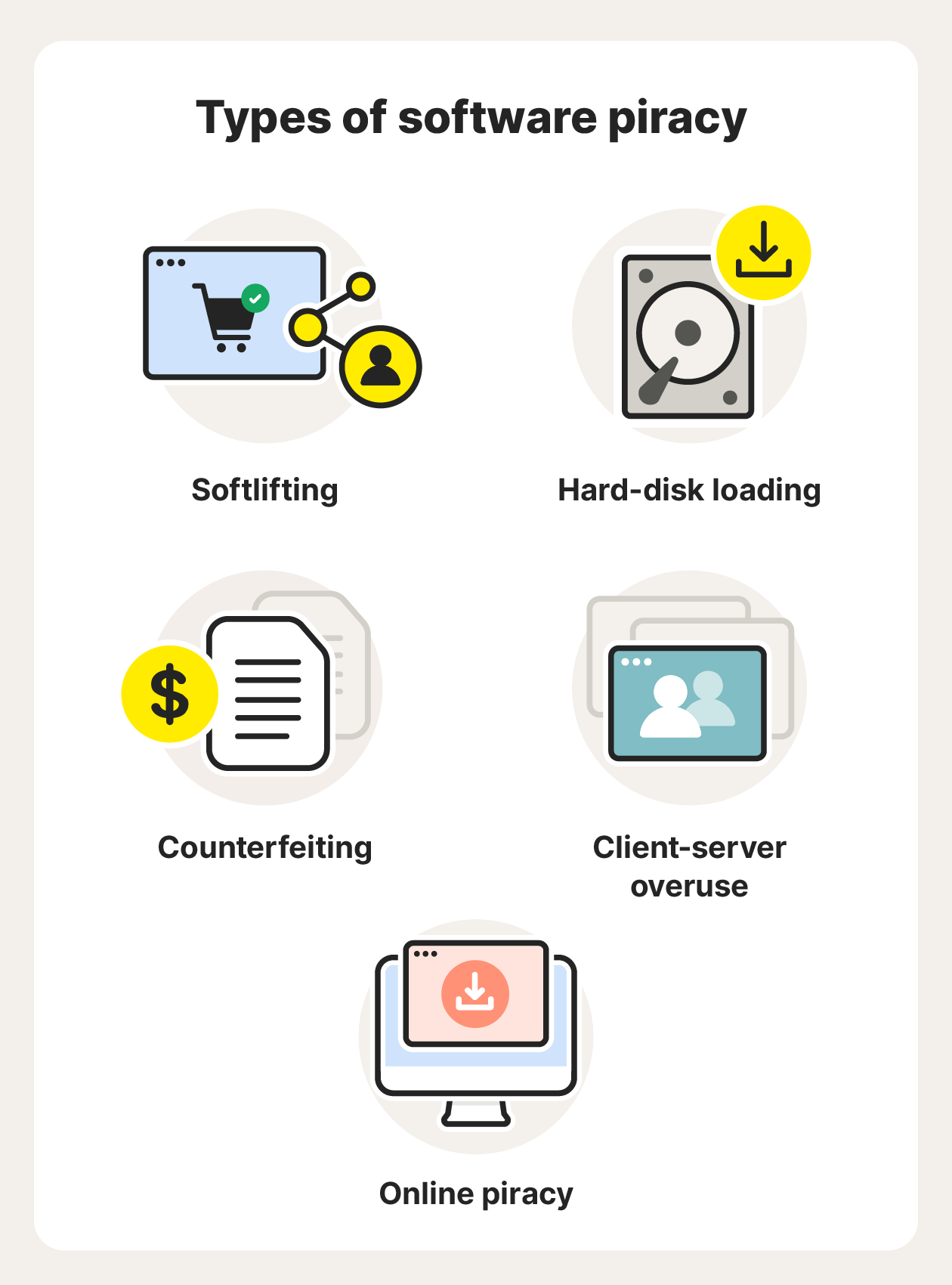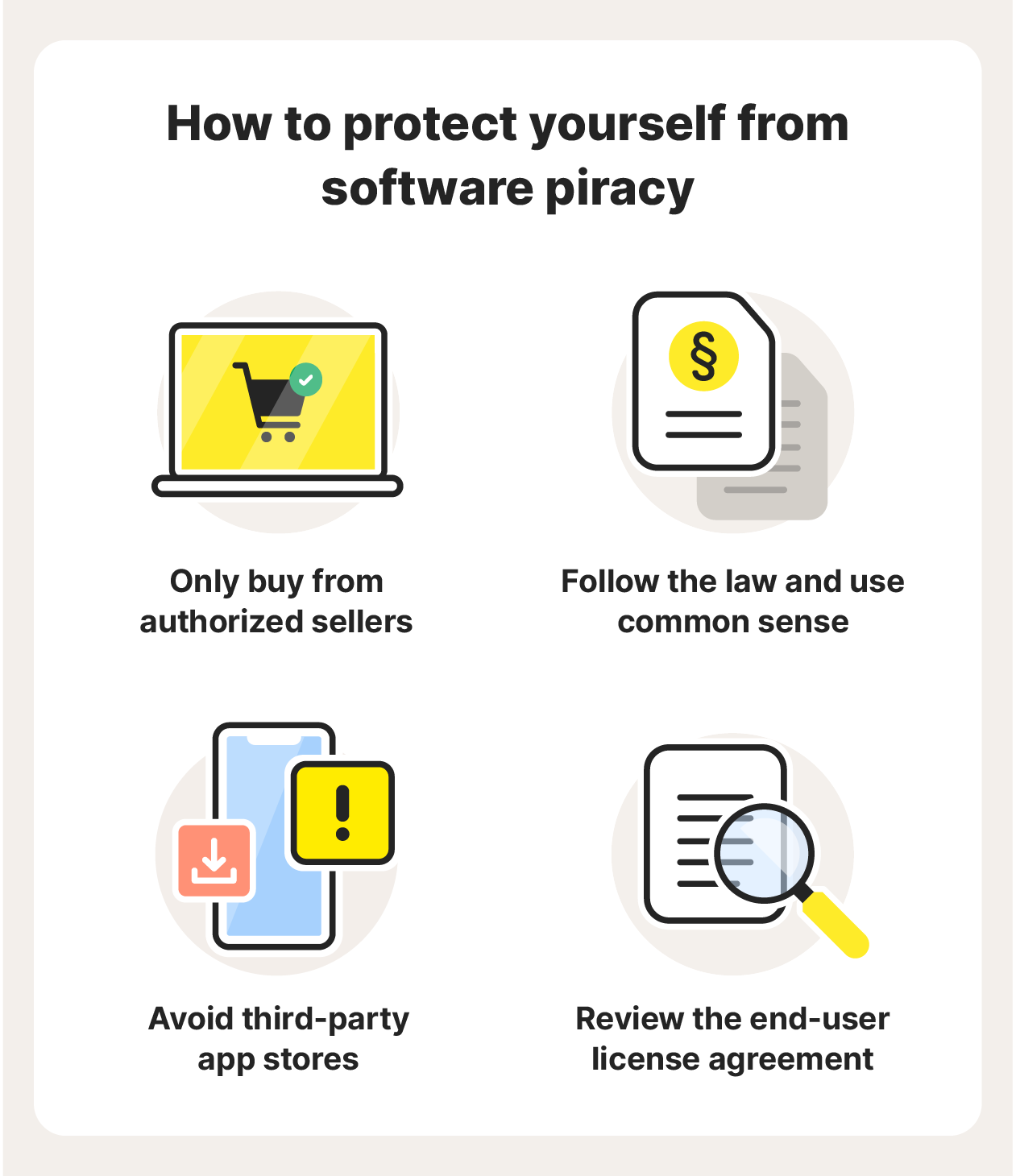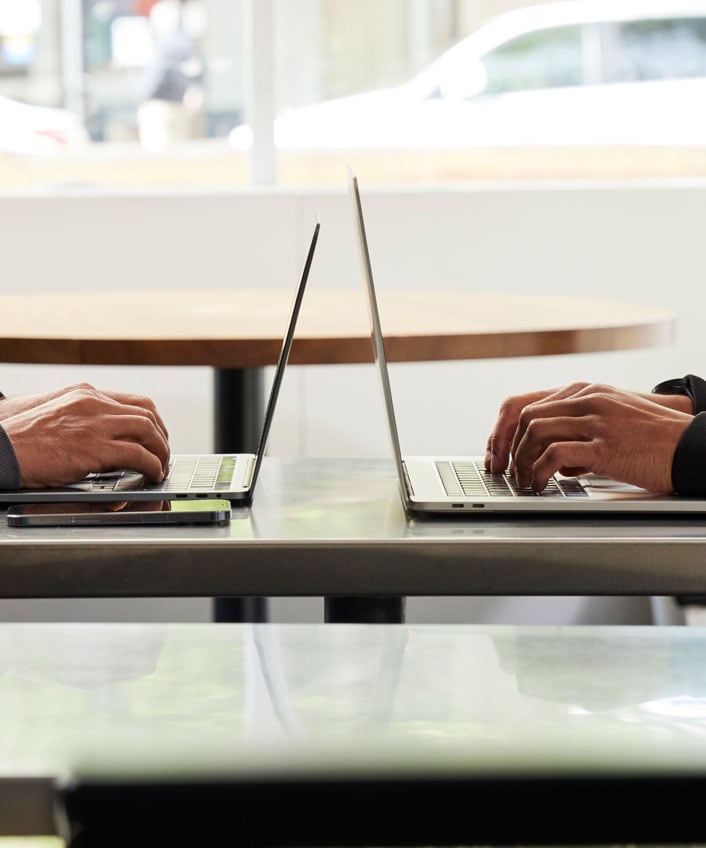Software piracy: Types, risks, and how to stay safe

Software piracy is easier to commit than you might think — even accidentally. While it might not seem like a big deal, it can carry serious legal penalties, and there’s always a risk of malware hidden within pirated software. Learn about the different types of software piracy so you can avoid it, then get Norton 360 Deluxe to help protect against malicious files, dangerous downloads, and other cyberthreats you may not foresee.
What is software piracy?
Software piracy is the act of using, copying, or distributing software without permission. A software pirate is anyone who copies software or uses pirated software, either intentionally or unintentionally. Depending on the applicable copyright laws, software piracy can be illegal and carry severe penalties such as heavy fines or even prison time.
Types of software piracy
Think you know what software piracy is? You might be surprised by the different types of activities that are considered software piracy, some of which are considered cybercrimes. Here's a look at the different types, along with some examples:
Softlifting
Softlifting, or end-user piracy, happens when you buy software and share it with someone else. For example, you might buy a video editing app, install it onto your computer, and then give it to a friend to install on theirs. This act may seem innocent or even helpful, but depending on the software license and applicable laws, it may be illegal.
You may assume that once you’ve paid for software, you can do whatever you want with it, but that’s usually not the case. Laws against piracy are there to protect the software author or creator and to help ensure they get the payment and recognition they deserve. Unless stated otherwise, when you purchase software, you shouldn’t let someone else copy it or install it on another device.
Hard-disk loading
Hard-disk loading is when a software pirate makes a copy of legally-bought software and installs it on a hard drive. Then, the pirate sells the hard drive to someone else. This is a type of commercial software piracy and usually involves copying software to install it on hardware like computers or game consoles.
For example, imagine you’re shopping online for a new PlayStation console and someone sells you a system that’s preloaded with several digital games. Because you’re not the authorized end-user of the games, both you and the seller would be committing hard-disk loading. To stay protected from potentional legal trouble, only use software that you purchase and download yourself.
Counterfeiting
Counterfeiting is probably the most common example of software piracy. It happens when a pirate illegally copies a piece of software and then sells it. Think about the last time you heard about someone selling counterfeit name-brand clothing. Software pirates do the same thing when they create or sell pirated movies or counterfeit computer programs.
Counterfeit software can be enticing because it’s usually sold at a steep discount. But the risks outweigh the benefits. Not only can creating, distributing, or using counterfeit software violate the Digital Millennium Copyright Act (DMCA), but the software itself may be infected with harmful code and pose serious risks. Counterfeit software can come loaded up with viruses or other malware, and it can even provide hackers backdoor access to your private data online.
Client-server overuse
Client-server overuse is when more people use a version of a program than the license is meant for. This can happen in businesses or schools when software is downloaded onto a local area network. If more people use the software than the license states, it could be a case of software piracy.
For example, a business owner might be tempted to try and save money by purchasing a single license and sharing it among employees, instead of buying separate licenses for each staff member.
Online piracy
Online piracy is when someone illegally shares pirated software online, whether for payment or for free. Downloading and using torrents, such as pirated movies, apps, or operating systems, can constitute computer piracy.
For example, someone on social media may mention a site where they download free ebooks or software, and before you know it you’re surfing a grey market site for a key to access free or cheap pirated content without thinking about the potential legal implications.

Dangers of software piracy
The legal consequences of software piracy can be severe — some countries impose jail time for pirating programs, often with steep fines, too. But the legal ramifications are far from the only dangers. Pirated software can be riddled with malicious files and other junk that can cause serious problems to your device. Practice software piracy prevention to protect your personal data and devices from security risks.
Possible dangers of piracy include:
- Malware: Getting free illegal software comes with hidden costs, such as the possibility of malware hidden within a pirated program. Types of malware include ransomware, spyware, and viruses. Hackers can use pirated software as bait to spread malware.
- Adware: Adware is a type of harmful software that inundates your device with banners, pop-ups, and other annoying ads. While not always illegal, adware can spam you relentlessly, and it can be a vehicle to deliver malware. Pirated software sometimes contains adware that earns pirates money from clicks or commissions.
- Malicious websites: In order to download pirated software, you need to visit unsafe sites where illegal software is available. Because these sites may operate outside the law, visiting them can put your safety and privacy at risk. Malicious websites, which can include torrent sites, can be full of harmful ads, infected files, and other risks.
- Identity theft: Software pirates might be hackers in disguise, offering you something for free in order to infiltrate your network with malware and steal your identity. Strong cybersecurity tools like Norton 360 Deluxe can help protect you against hackers getting access to your devices, financial info, or social media accounts.
- Damage to your device: Software might only be digital code, but it can cause irreparable damage to your physical devices. Ransomware, for example, holds critical data hostage and sometimes deletes it permanently, rendering your device unusable. Other types of malware can shut off your device’s cooling systems, damaging its hardware.
- Lack of updates: Even malware-free pirated software can leave you vulnerable to attack or infection. Most pirated software can’t be updated, leaving you less able to avoid viruses and more exposed to malware and other threats.
How to protect yourself from software piracy
Understanding the different types of software piracy can help you avoid software theft and its consequences. Here are a few general rules to keep in mind to help protect yourself:
- Buy only from authorized sellers. When buying software, your safest bet is to buy directly from the developer or official app stores like the App Store or Google Play. If you want to buy Microsoft Office, go to Microsoft’s website. It’s also safe to buy from authorized vendors, including major retailers like Amazon and Best Buy. Avoid unknown venders, especially those offering very cheap prices.
- Follow the law. It may not be easy to understand all the legal dos and don’ts when it comes to software piracy, and the DMCA does carve out exceptions for when it’s okay to circumvent the access control measures that protect copyright. Use common sense: don’t use paid, licensed software that you didn’t buy and don’t give licensed software to someone else, whether you paid for it or got it for free.
- Avoid third-party app stores. You’re probably used to downloading apps from official app stores like Apple’s App Store and Google Play. But there are other, unauthorized vendors known as third-party app stores that may not be safe. These stores may lack the protection and security of authorized app stores and other official marketplaces, making it easier for malicious software to slip through. And they’re also places where pirates may list counterfeit apps.
- Review the end-user license agreement. Whenever you buy software, review the license agreement and terms and conditions. This may seem tedious and unnecessary, but it’s where the company describes the conditions of the use of their software, and taking the time to read can help you learn whether it’s OK to share the software or not.

Protect yourself against dangerous software
Downloading software is such a normal part of life that you probably do it without much thought. After all, we’re almost always just a click or two away from downloading a new program. But this ease can make it easy to unintentionally participate in software piracy or become the victim of malware hidden inside seemingly innocuous files.
Thankfully, there are steps you can take to help avoid dangerous downloads and harmful files. Good digital hygiene will go a long way, including using a specialized digital security app from a brand you can trust. Norton 360 Deluxe is built and maintained by experts in online security, and it will help block hackers and keep you safe from malicious websites and other threats.
FAQs about software piracy
Is software piracy a crime?
Software piracy is a crime if it violates the Digital Millennium Copyright Act or other applicable copyright laws. If software piracy is judged to have circumvented copyright-protecting access control systems within technology, devices, or services, then it may be illegal and can result in serious penalties such as fines and jail time.
While the DMCA carves out exceptions for non-profits, educational institutions, security researchers, and others, violating copyright through software piracy, both creating pirated software and using pirated software, can have serious legal consequences, even if done unintentionally.
What are software pirates?
Software pirates are people who copy, trade, or use software without permission or in violation of the software license. This includes anyone who steals software, sells or uses software that’s been illegally acquired, or who shares legitimate software when it’s not permitted.
Are all forms of software piracy illegal?
In the US, software piracy is considered illegal if it violates the Digital Millennium Copyright Act or other applicable copyright law. Generally, the DMCA makes it illegal to circumvent built-in anti-piracy safeguards or create, sell, or distribute software or devices used to copy software illegally.
Of course, the DMCA does lay out exceptions that describe when it might be acceptable to bypass built-in anti-piracy measures, such as when used for encryption research. And copyright law varies from country to country, so an act that may be considered illegal software piracy in one country may not be illegal in another.
Editorial note: Our articles provide educational information for you. Our offerings may not cover or protect against every type of crime, fraud, or threat we write about. Our goal is to increase awareness about Cyber Safety. Please review complete Terms during enrollment or setup. Remember that no one can prevent all identity theft or cybercrime, and that LifeLock does not monitor all transactions at all businesses. The Norton and LifeLock brands are part of Gen Digital Inc.





Want more?
Follow us for all the latest news, tips and updates.